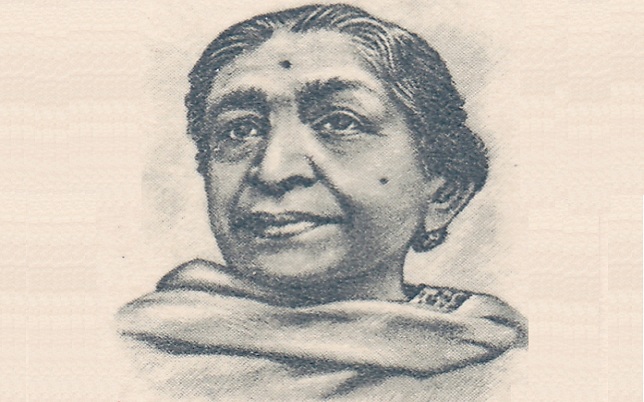Sarojini Naidu (1879 – 1949) was an Indian political activist and poet. She was a proponent of civil rights, women’s emancipation, and anti-imperialistic ideas and was an important figure in India’s struggle for independence from colonial rule. Naidu’s work as a poet earned her the sobriquet ‘Nightingale of India’ by Mahatma Gandhi. She was called ‘Bharat Kokila’ by Rabindranath Tagore.
Sarojini Naidu was much influenced and impressed by Islamic ideals. Following are the excerpts from a talk given to the Young Men’s Muslim Association, Madras in 1917.
“Even at the risk of being considered egotistical and conceited, I acknowledge that whenever I go to a new city, I always look for my special welcome from the Mussalmans of the place. Never have I been disappointed or defrauded of my right. It is my right, because I come from the premier Mussalman city (Hyderabad) in India.
The premier Mussalman power in India (the Nizam of Hyderabad) rules over the city from which I come, and there the tradition of Islam has truly been carried out for two hundred years, that tradition of democracy that knows how out of its (Islamic) legislation to give equal rights and privileges to all the communities whose destinies it controls”.
Islamic Ideals are Supremely Progressive
“Though I stand side by side with you as a Kaffir, I am a comrade in all your dreams. I stand beside you in your dreams and aspirations, because the ideals of Islam are so essentially and supremely the progressive human ideals that no human soul that loves progress can refuse allegiance to those ideals.
One has to look back to see how the vision of tomorrow may be linked with the vision of the past; and therefore if, in speaking of the ideals of Islam, I take you through a long journey into the past, it is only that you may realise, what only the other day it was my privilege to say to the young generation: that it is only in her (Islamic) ideals that we find seeds of immortality, and that if there be today vitality in the Muslim people, it is because the seed was sown into the Desert, and the Desert blossomed with roses.
Come with me into the Desert where the sun is dazzling, where the people are brave, simple, quick to revenge an insult, strong to defend honour.
What is it that the youngest of the religions has given to the world? Of the old religions, some have died and some are still living.
When we come to the religion of the Desert, we find that wonderful adjustment between the spiritual and the temporal, for it was the religion of Islam that built up political empires”.
Islam has the Most Modern and Larger Outlook
“Brotherhood is the fundamental doctrine that Islam taught: –Brotherhood of civic life, of intellectual life, of spiritual life in the sense of leaving other religions and creeds free to offer their worship.
This is what we call modern toleration, the larger outlook, this is what we call civilisation; this is what we call the real understanding of human characteristics, the real understanding of those sources that bind human hearts to one another.
Ancient Hindu India laid the foundation of her civilisation on the position and responsibility of woman. In modern times, the legal status given to woman is supposed to be a great test of civilisation.
Islam, coming centuries later than the Hindu religion, revealed the old world truths in a new language through a new medium, and once more asserted the abiding verity that gave woman her responsibility and her place in the National life, by giving her not merely her honour due as wife and mother, but as citizen responsible and able to administer her own property, to defend her own property, because it was hers and she was not dependent as mere goods and chattels on husband’s and brother’s bounty”.
Justice of Islam is Most Wonderful Ideal
“(The) sense of justice is one of the most wonderful ideals of Islam, because as I read the Koran, I find those dynamic principles of life: not mystic, but practical ethics for the daily conduct of life, suited to the whole world.
We are fond of saying that we belong to a rational age, that we belong to a practical age. If you belong to a practical and rational age, what more shall you find than those codes of ethics laid down so clearly for your daily conduct? How far-seeing was the wisdom that laid down as religious law those great principles that tended to conserve the Brotherhood that the religion taught!”
Hajj – A Real Manifestation of Islamic Brotherhood
“What was the meaning of the Haj?
Did it matter to God that thousands of Mussalmans went to one place or another, since He is everywhere? No.
The meaning was that streams of pilgrims from various lands, speaking various tongues, having various traditions and customs, should meet together in one common place, and through one common association and memory, to consolidate the Brotherhood that Islam preached”.
Islam Makes Brothers out of Strangers
“When we look at the lego-religious (sic) law, what is laid down there is the outcome of the prophetic vision that realises that civilisation would tend more and more towards democracy.
It (Islam) was the first religion that preached and practised democracy, for in the mosque when (from) the minaret (the call to prayer) is sounded and the worshippers are gathered together, the democracy of Islam is embodied five times a day when the peasant and the king kneel side by side and proclaim, “God alone is great.”
I have been struck over and over again by this indivisible unity of Islam that makes a man instinctively a brother”.
India Needs Islam More than Anything Else
“That is the clay that came across the seas — the clay from the Desert to be mingled with the Vedic clay; not only the clay that came from Persian Zoroastrians or from the European Christians in the shape of this National life;
but we want, more than all other clays to be mingled with the Vedic clay, that clay which is the Desert clay of Islam, because we feel that unless and until these two great elements are blended together (and) unified, so that they can never be separated, there can be no vessel of National life that can last for time and centuries”.1
1. Great Women of Modern India vol. 3: Sarojini Naidu, ed. by Verinder Grover and Ranjana Arora (New Delhi: Deep & Deep Publications, 1993), pp. 51-56

